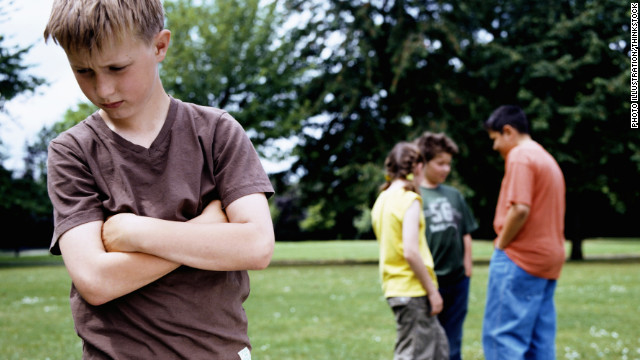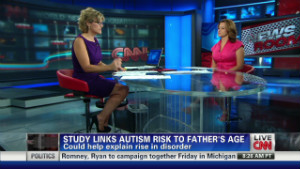Link:
http://www.cnn.com/2012/09/07/health/autistic-kids-bullied-time/index.html?hpt=us_c2
Why autistic kids make easy targets for school bullies
updated 8:40 AM EDT, Fri September 7, 2012

Fear often leads to exclusion and derision,
experts say.
STORY HIGHLIGHTS
- Study finds 46% of autistic children in middle, high school are victimized
- People with autism have trouble recognizing social cues, reporting bullying
- Highest functioning children in the study were at greatest risk
In the study, about 46% of
autistic children in middle and high school told their parents they were
victimized at school within the previous year, compared with just over 10% of
children in the general population.
Calling it a "profound public
health problem," lead author Paul Sterzing of Washington University in St. Louis
told the New York Times that the "rate of bullying
and victimization among these adolescents is alarmingly high."
Many people with autism have
trouble recognizing social cues, which makes them awkward around others. They
also often engage in repetitive behaviors and tend to be hypersensitive to
environmental stimuli, all of which makes kids with the disorder ripe targets
for bullies who home in on difference and enjoy aggravating their victims.
 Voices of the
disabled
Voices of the
disabled  Older fathers may be linked to
autism
Older fathers may be linked to
autism
About a third of autism cases are
severely disabling — those affected may suffer from low IQ and be unable to talk
— but most autistic people have average or high intelligence and many can
function well, if their social and sensory issues are appropriately
addressed.
That may help explain why the
highest functioning children in the current study were at greatest risk of being
bullied. While their social awkwardness was more obvious because they actually
interacted more with mainstream peers, this made their actual disability less
visible, likely making their condition harder for their peers to understand.
Children with autism who could
speak well, for example, were three times more likely to be bullied than those
whose conversational ability was limited or absent.
Further, those who were mainly
educated in mainstream classrooms were almost three times more likely to be
bullied than those who spent most of their time in special education.
The research, published in the
Archives of Pediatric and Adolescent Medicine, involved survey
data from 920 parents of autistic children, who were asked about their
children's experience of bullying.
About 15% of autistic children
were reported to be bullies themselves — roughly the same rate as in the general
teen population — and 9% were both bullies and victims. Bullying, which can take
the form of teasing, exclusion, humiliation or physical assault, can lead to
depression and other mental health problems, along with poor grades and even
physical illness in victims because of the severe stress it causes.
Parents of autistic children
think that the true rates of victimization are far higher than what the study
found, and that the rates of perpetrating bullying are lower, precisely because
autism disorders are characterized by an inability to read subtle social cues
and by difficulty with communication.
In order to report being
bullied, you need to understand when you're being targeted, for example; in
contrast, you also need to understand and effectively deploy harassing social
information in order to be a bully — things that autistic children generally
cannot do.
"The only thing I can figure out
is that maybe the parents are misinterpreting their children's clumsy attempts
[to socialize]," says Eileen Riley-Hall, a high-school teacher with an autistic
daughter and author of "Parenting Girls on the Autism Spectrum: Overcoming the
Challenges and Celebrating the Gifts," regarding the rate of bullies among
autistic kids in the new study.
"I think of bullying as
systematic manipulation. But [autistic children] are so candid, they're
typically not capable of that kind of forethought and malice."
Impaired language skills and
inability to read social cues also mean that many autistic children are bullied
without ever realizing it or being able to report it.
Riley-Hall recalled an incident
involving her daughter in elementary school. "Little boys were getting her to
say dirty words and laughing at her. She thought this was a good thing and that
they were being friendly, but they were really making fun of her," she says,
describing how another girl, who knew it was wrong, told the teacher. But until
the classmate reported it, Riley-Hall had no idea that her daughter was being
bullied.
With recent national focus on
the toll of school bullying, including bullying-related suicide, many school
districts are updating their anti-bullying policies and states are giving the
issue renewed legislative attention.
Research finds that the best
anti-bullying programs are comprehensive, involving the entire school and not
just individual students. Programs that work well tend to encourage a warm
school environment in which diversity is celebrated; they also rely on adults at
the school, from the principal to the lunch ladies, to set a tone that clearly
indicates that bullying isn't acceptable.
Studies find that students in
schools that create such a welcoming atmosphere not only perform better
academically, but also have lower rates of behavior problems like alcohol and
drug use.
But despite efforts to encourage
inclusion, acceptance of students with disabilities remains low overall.
"There's still a sense that they are not as fully human as other people," says
Riley-Hall.
Another factor that often leads
to exclusion and derision is fear. "We have many generations who have had no
personal experience with people with special needs, and they fear them,"
Riley-Hall notes. "They pass that ignorance on to their children."
As the study's authors conclude:
"Inclusive classrooms need to increase the social integration of adolescents
[with autism] into protective peer groups while also enhancing the empathy and
social skills of typically developing students towards their peers with [autism]
and other developmental disabilities."
Indeed, although autistic people
are often claimed to lack empathy, their problems usually relate to an inability
to understand the minds of others— not an actual lack of care when they know
someone is suffering.
Meanwhile, people without autism
aren't supposed to be impaired in understanding others' pain, so what's our
excuse?
This story was originally
published on TIME.com

No comments:
Post a Comment